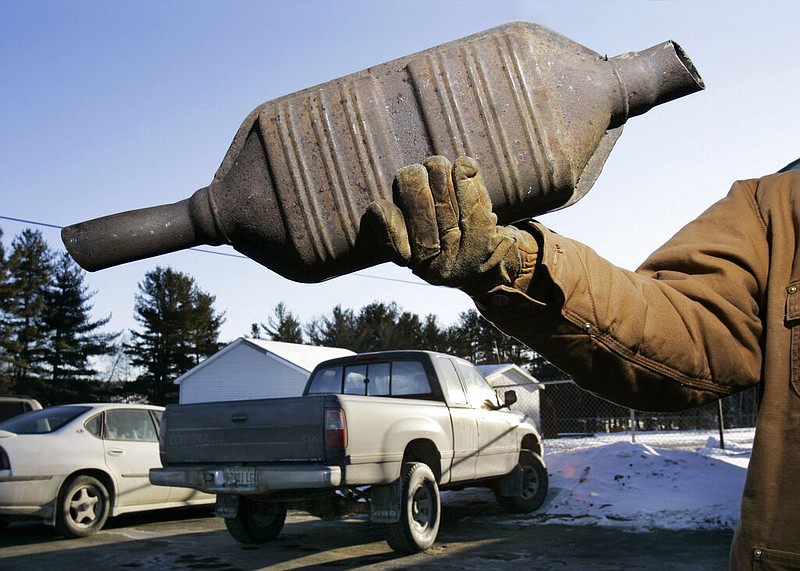The Arkansas House on Wednesday advanced bills intended to curb distracted driving and to address mounting thefts of catalytic converters.
House Bill 1486 would create a criminal penalty for drivers who cause serious physical injury or death while using "wireless telecommunications" devices. The measure passed on a vote of 80-5 and moves to the Senate for further consideration.
Rep. Ashley Hudson, D-Little Rock, said she sponsored the bill in honor of Ashton Rae Woods, a woman who was killed in an accident with a distracted driver. Woods, 33, was involved in a two-car accident Oct. 7 on Arkansas Highway 263 in rural Stone County, according to a report from Arkansas State Police.
Hudson said Woods had served as a full-time missionary until the coronavirus pandemic and left behind two sisters, a father and "loads and loads of family members who care very deeply about her."
The bill originated after Woods' father contacted Hudson and asked her if there were any laws penalizing distracted drivers who cause serious harm or death.
While current statutes include fines for people who are pulled over for texting and other distractions, Hudson said there are no enhancements for distracted drivers responsible for accidents resulting in serious injury or death.
"Her dad decided to take Ashton's legacy of living a life of service and to try to make her death a service to her community as well," Hudson said.
The bill would establish a Class A misdemeanor for drivers who cause collisions or accidents that result "in serious physical injury or death of another person" while "using a wireless telecommunications device."
A violation of the law would be punishable by imprisonment for no more than a year, up to 100 hours of community service and a fine not to exceed $2,500.
Hudson said the misdemeanor could serve as a stand-alone charge or be added to cases where a driver faces other charges related to an accident.
State and county law enforcement officials have said they are capable of investigating accidents to determine if distracted driving was a cause, Hudson said.
Rep. Justin Gonzales, R-Okolona, asked if the bill would apply to drivers using hands-free devices or their cell phones to play music.
Hudson said her bill would apply a definition of distracted driving already used in state law for ticketing drivers.
"I would say that generally speaking if you're messing with your phone for your Bluetooth or your music, that probably would qualify if you're looking down at your phone instead of looking at the road," she said.
If enacted, the bill would create Ashton's Law.
[DOCUMENT: Read the bill targeting catalytic converter thefts » arkansasonline.com/32hb1365/]
CATALYTIC CONVERTERS
House Bill 1365, which aims to make the "unauthorized possession of a catalytic converter" a felony and increase penalties for the theft of a catalytic converter, passed the House with a vote of 97-0. The bill, sponsored by Rep. Mike Holcomb, R-Pine Bluff, moves to the Senate for further consideration.
Holcomb presented his bill as a measure needed to address the widespread theft of catalytic converters from vehicles.
"Probably everyone here has had a neighbor or yourself or your church had a catalytic converter stolen," he said.
Holcomb said lawmakers have filed more than a 100 bills in nearby states related to the theft of catalytic converters.
Between 2019 and 2022, catalytic converter thefts nationwide increased by 1,215%. Converters contain precious metals including rhodium, palladium and platinum, which have skyrocketed in value, according to the National Insurance Crime Bureau.
Holcomb said he met with stakeholders, including representatives of scrap metal recyclers, county officials and law enforcement officers, to create the bill.
Under current law, Holcomb said law enforcement officials can't take any action against a person for possessing multiple catalytic converters.
If the bill were to pass, a person could be charged with a crime if they knowingly "possess a catalytic converter that has been removed from a motor vehicle and that is not permanently marked." The measure would not apply if the person is the owner of the vehicle from which the converter was removed or possess the converter in the "ordinary course" of their business.
A converter would have to be marked with the date it was removed from the vehicle and the identification number of the vehicle.
The bill lists several businesses including scrap metal recyclers, towing companies and used automotive parts recyclers that may normally possess catalytic converters.
Theft of a catalytic converter would be a Class C felony under the bill.
"Unauthorized possession of a catalytic converter" would be a Class C felony if the person has been convicted of the offense before or if the person also "commits or attempts, conspires, or solicits another person to commit an offense related to a catalytic converter."
Otherwise, the offense would be a Class D felony, under the bill.
The bill also would require scrap metal recyclers to register with county sheriffs and maintain records of used catalytic converter purchases like other buyers of used catalytic converters.

